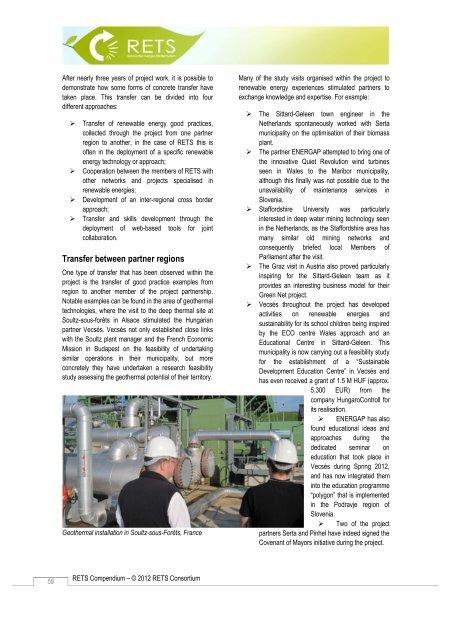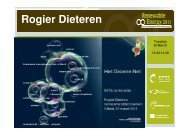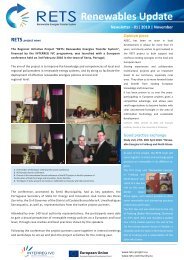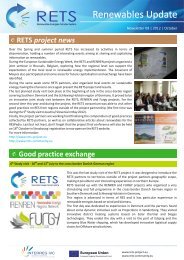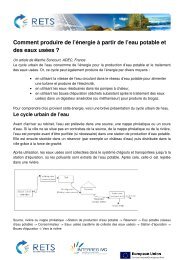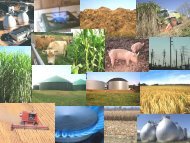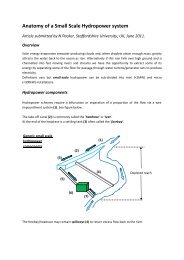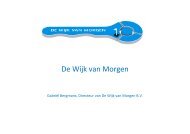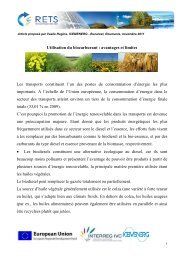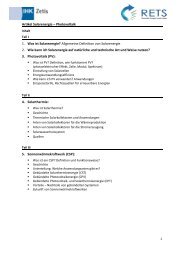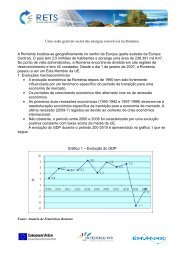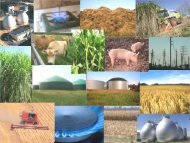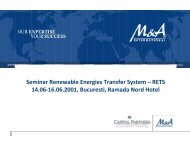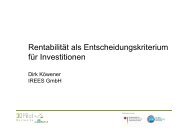Promoting renewable energies - RETS Project
Promoting renewable energies - RETS Project
Promoting renewable energies - RETS Project
You also want an ePaper? Increase the reach of your titles
YUMPU automatically turns print PDFs into web optimized ePapers that Google loves.
After nearly three years of project work, it is possible to<br />
demonstrate how some forms of concrete transfer have<br />
taken place. This transfer can be divided into four<br />
different approaches:<br />
Transfer of <strong>renewable</strong> energy good practices,<br />
collected through the project from one partner<br />
region to another, in the case of <strong>RETS</strong> this is<br />
often in the deployment of a specific <strong>renewable</strong><br />
energy technology or approach;<br />
Cooperation between the members of <strong>RETS</strong> with<br />
other networks and projects specialised in<br />
<strong>renewable</strong> <strong>energies</strong>;<br />
Development of an inter-regional cross border<br />
approach;<br />
Transfer and skills development through the<br />
deployment of web-based tools for joint<br />
collaboration.<br />
Transfer between partner regions<br />
One type of transfer that has been observed within the<br />
project is the transfer of good practice examples from<br />
region to another member of the project partnership.<br />
Notable examples can be found in the area of geothermal<br />
technologies, where the visit to the deep thermal site at<br />
Soultz-sous-forêts in Alsace stimulated the Hungarian<br />
partner Vecsés. Vecsés not only established close links<br />
with the Soultz plant manager and the French Economic<br />
Mission in Budapest on the feasibility of undertaking<br />
similar operations in their municipality, but more<br />
concretely they have undertaken a research feasibility<br />
study assessing the geothermal potential of their territory.<br />
Geothermal installation in Soultz-sous-Forêts, France<br />
Many of the study visits organised within the project to<br />
<strong>renewable</strong> energy experiences stimulated partners to<br />
exchange knowledge and expertise. For example:<br />
The Sittard-Geleen town engineer in the<br />
Netherlands spontaneously worked with Serta<br />
municipality on the optimisation of their biomass<br />
plant.<br />
The partner ENERGAP attempted to bring one of<br />
the innovative Quiet Revolution wind turbines<br />
seen in Wales to the Maribor municipality,<br />
although this finally was not possible due to the<br />
unavailability of maintenance services in<br />
Slovenia.<br />
Staffordshire University was particularly<br />
interested in deep water mining technology seen<br />
in the Netherlands, as the Staffordshire area has<br />
many similar old mining networks and<br />
consequently briefed local Members of<br />
Parliament after the visit.<br />
The Graz visit in Austria also proved particularly<br />
inspiring for the Sittard-Geleen team as it<br />
provides an interesting business model for their<br />
Green Net project.<br />
Vecsés throughout the project has developed<br />
activities on <strong>renewable</strong> <strong>energies</strong> and<br />
sustainability for its school children being inspired<br />
by the ECO centre Wales approach and an<br />
Educational Centre in Sittard-Geleen. This<br />
municipality is now carrying out a feasibility study<br />
for the establishment of a “Sustainable<br />
Development Education Centre” in Vecsés and<br />
has even received a grant of 1.5 M HUF (approx.<br />
5.300 EUR) from the<br />
company HungaroControll for<br />
its realisation.<br />
ENERGAP has also<br />
found educational ideas and<br />
approaches during the<br />
dedicated seminar on<br />
education that took place in<br />
Vecsés during Spring 2012,<br />
and has now integrated them<br />
into the education programme<br />
“polygon” that is implemented<br />
in the Podravje region of<br />
Slovenia.<br />
Two of the project<br />
partners Serta and Pinhel have indeed signed the<br />
Covenant of Mayors initiative during the project.<br />
58<br />
<strong>RETS</strong> Compendium – © 2012 <strong>RETS</strong> Consortium


